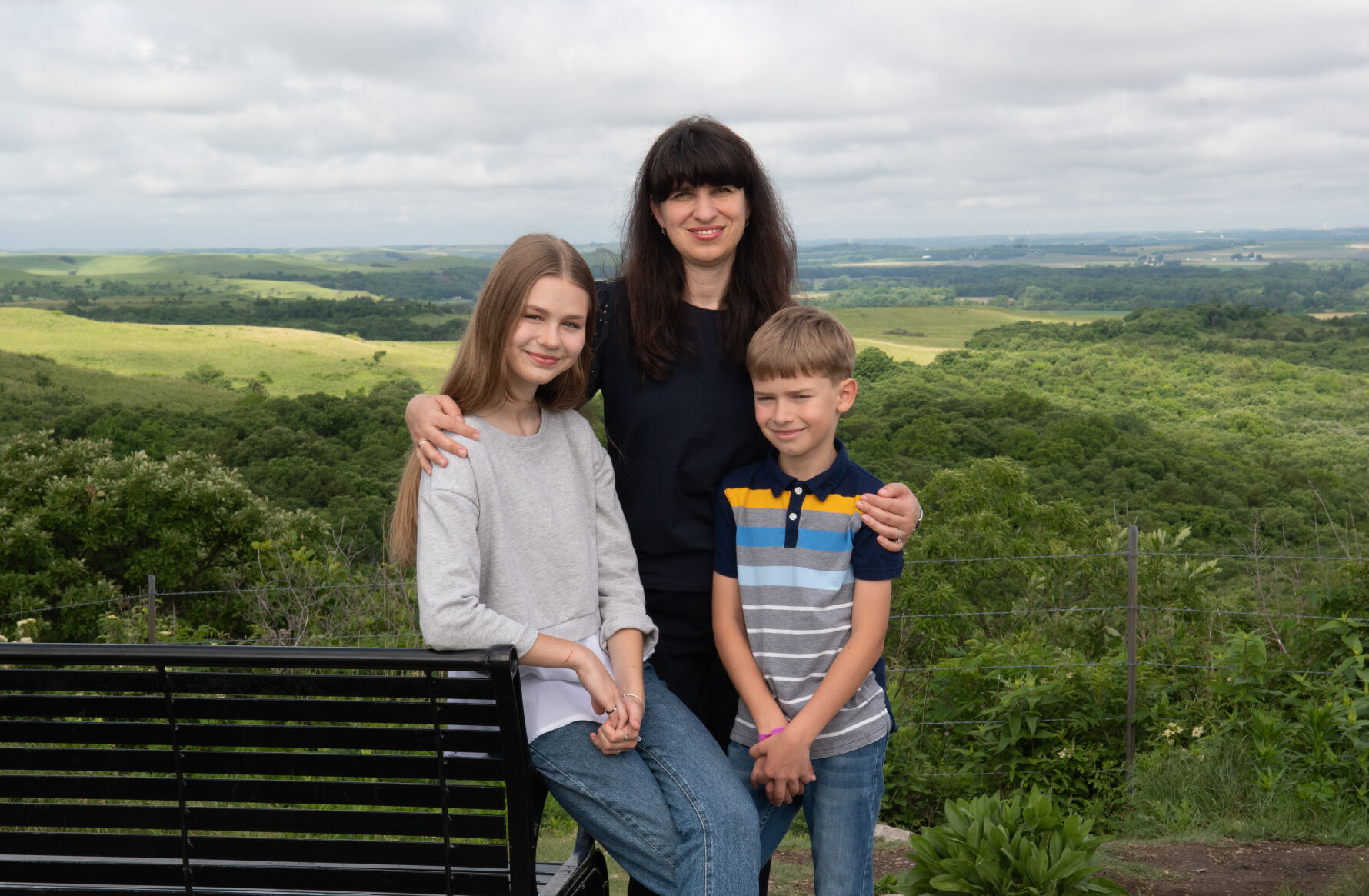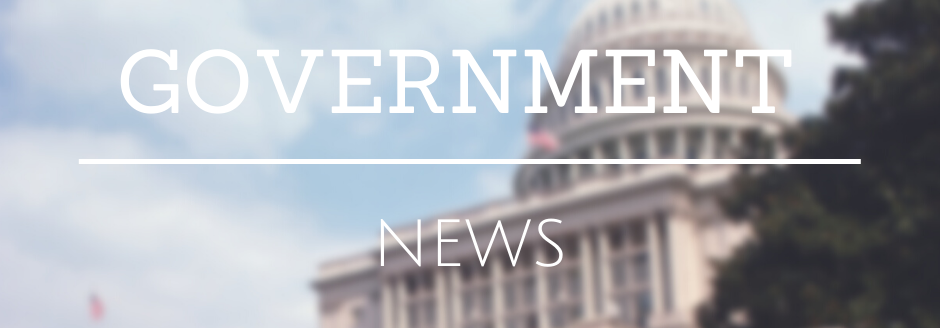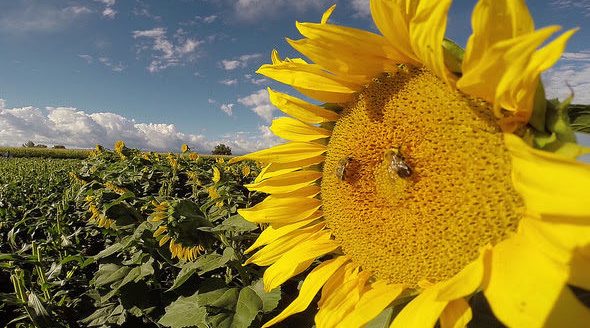A Ukrainian agricultural economist believes her country, which over the past 20 years has helped feed the world, will rebound following Russia’s invasion but adds it is going to take time.
Antonina Broyaka, Ph.D., recently received her U.S. work visa and was named Extension associate of Kansas State University’s Agricultural Economics Department. Since coming to Manhattan in March, she volunteered her time giving seminars to students, faculty, and the public on the global impact of Russia’s Ukrainian invasion at K-State. She is an expert on the Ukraine agricultural economy, which she has closely followed since Russia’s invasion in late February.
She recently spoke about her expectations and her relationship with K-State alongside Ernie Minton, dean of K-State’s College of Agriculture and director of K-State Research and Extension. In this role, he is focused on advancing the college’s agriculture legacy as one of the nation’s top academic programs, and K-State’s Research and Extension’s mission through research, outreach, engagement, and economic development. He strongly believes that the land-grant institutions are natural partners with other countries because of the importance of agricultural production.
Minton said Broyaka’s knowledge of the Ukraine region provides unprecedented insight even as it comes against the backdrop of what Minton terms a terrible war.
Broyaka had come to conduct research and adopt educational experiences of K-State as a Ukrainian Fulbright scholar two decades earlier. Before leaving her country, Broyaka served as dean of the faculty of Economics and Entrepreneurship at the Vinnytsia National Agrarian University in Vinnytsia, Ukraine.
After the invasion began, she and her husband made a decision to keep their children from harm’s way. Antonina and their children first moved to Poland.
“Our friends in Poland were so kind, but I knew I needed to put as much distance as possible between my children and the Russians,” Broyaka said. “I am convinced the Russians will try to advance beyond the Ukrainian borders.” Broyaka hopes the war will end soon but she and her children plan to stay in Manhattan for the foreseeable future.
“I try to explain how the Russian invasion has impacted global food production and created food insecurity,” she said.
Broyaka said it is important for people involved in all levels of agriculture to understand the crisis so they know what they can do to develop a clear plan and stabilize global food supplies. Africa, she said, is particularly at risk with food insecurity. The Russian strategy has been to close Ukraine ports and outlets needed to export commodities.
She called the invasion the start of a new cold war that Europe, NATO, and the United States will have to contend with. She understands that Russian President Vladimir Putin wants to expand and one of his weapons in the war is controlling the food supply. That strategy should concern the entire global community.
Minton said as a result the U.S. has assisted in combating Russian aggression in the Ukraine and that is the right action. Broyaka appreciated the U.S. support because the consequences are far reaching.
“This is not only a war in the Ukraine. It will also change the economic structure globally and that is why we need to stop Russia. It’s not just about the Ukraine (markets) but the world markets in general,” Broyaka said.
Broyaka also shares the challenges Ukrainian farmers now face in not only trying to plant and harvest but in selling their crops.
Minton said it is a story that America needs to hear and Broyaka is the right person tell it. If the war ended today it would be several years before Ukraine’s infrastructure will be fully restored, Broyaka said. Cropland, machinery and access to inputs and exports are all going to need to recover.
Heartland help
Land-grant institutions have for many years had a mission to help U.S. producers with technology and research and other tools to improve the global food system and reduce food insecurity, Minton said. Ukraine farmers, like their American counterparts, need high-quality seed and technology to produce and harvest grain needed to help feed other countries in the region. The land-grant institutions are a natural extension to assist.
Kansas farmers are either in the midst of or finishing their wheat harvest and half of the Kansas wheat crop is exported, he said, adding Ukraine producers grow wheat to feed their citizens and also for exporting.
Broyaka said despite the many challenges she has been proud of her country as it has continued to fight, and she remains optimistic the invasion will end sooner than later. Key production areas have been damaged. Russians have destroyed storage facilities, and Ukrainian farmers are looking for ways to add capacity on their farms, which may include large temporary plastic bag systems similar to what producers in the U.S. have used on their farm operations.
Common values
Broyaka said High Plains and Ukrainian farmers share common values of understanding the value of hard work, the importance of soil stewardship and the need to help feed the world. The state-of-the-art agricultural producers before the invasion were No. 1 in sunflower oil exports, No. 3 in corn exports (the U.S. is No. 1) and No. 6 in wheat exports (Russia is No. 1, Canada is No. 2 and the U.S. is No. 3), she said.
Broyaka said like American farmers, Ukrainian producers value their independence. With the collapse of the former Soviet Union, Ukraine voted to become a free and independent country in 1991.
When Russian bombs began to hit Kiev, she and husband, Volodymyr Lapshov, made the decision that she should leave the country with their children, 15-year-old Oleksandra (Sasha) and 9-year-old Maksym (Max). In two days, Lapshov was driving his wife and children to the Polish border. Lapshov could not leave with his family because although he is not in the military now he is conscripted and so he must be ready join the military when he is called.
“Our focus is on protecting our children at all costs,” Broyaka said. The decision meant leaving her husband and parents behind, giving up her position as dean of faculty of economics and entrepreneurship at Vinnytsia National Agrarian University and embarking on a dangerous journey that would take them to friends in Poland.
The typical five-and-a-half-hour trip took 24 hours because people living along the route blocked the road or dug trenches to keep tanks out. Broyaka remembers feeling very exposed because they were out in the open and there was traffic gridlock so they could not move quickly to protect themselves if attacked.
When Broyaka and her two children arrived in the U.S. they moved in with friend Sharolyn Flaming Jackson, a family and consumer sciences specialist for K-State Research and Extension in Manhattan.
She is appreciative of the welcome and opportunity she has at K-State and their willingness to allow her to speak about the challenges of the Ukrainian agricultural community. Minton said Broyaka’s knowledge is a wealth of information that also can help High Plains producers as they often share common values and goals.
Prior to being named dean in 2019, Minton spent 25 years as a faculty member for the Department of Animal Sciences and Industry at K-State and was recognized as one of the world’s top 2% of scientists within his field, according to a 2020 Stanford University study. Starting in 2008, Minton began serving in administrative roles, including as associate dean for research and graduate programs and associate director for the Kansas Agricultural Experiment Station.
During Minton’s tenure as dean, the College of Agriculture has been ranked in the top 10 nationally by two different independent assessments. He believes that continued investment into research is essential.
Dave Bergmeier can be reached at 620-227-1822 or [email protected].




